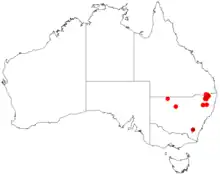Acacia pubifolia
Acacia pubifolia commonly known as velvet wattle,[2] is a flowering plant in the family Fabaceae and is endemic to northern New South Wales. It is an upright or spreading tree with bright yellow flowers.[3]
| Velvet wattle | |
|---|---|
 | |
| Scientific classification | |
| Kingdom: | Plantae |
| Clade: | Tracheophytes |
| Clade: | Angiosperms |
| Clade: | Eudicots |
| Clade: | Rosids |
| Order: | Fabales |
| Family: | Fabaceae |
| Subfamily: | Caesalpinioideae |
| Clade: | Mimosoid clade |
| Genus: | Acacia |
| Species: | A. pubifolia |
| Binomial name | |
| Acacia pubifolia | |
 | |
| Occurrence data from AVH | |
Description
Acacia pubifolia is a single-stemmed shrub or tree to 8 m (26 ft) high with dark, rough bark. The branches are brown or orange to brown, occasionally slightly covered with a powdery, waxy coating and softly hairy. The phyllodes are elliptic or narrowly egg-shaped, straight, 2–10 cm (0.79–3.94 in) long, 8–30 mm (0.31–1.18 in) wide, velvety hairy, aging to soft, erect hairs, and prominent veins from tip to base. One or two flowers are borne in phyllode axils, more or less sessile, flower heads cylindrical, 2–5 cm (0.79–1.97 in) long, golden yellow, peduncle 0–2 mm (0.000–0.079 in) long, white and thickly hairy. The calyx is 0.5–0.9 mm (0.020–0.035 in) long, squared or deeply divided part of the length, white, softly hairy, corolla 1.6–1.8 mm (0.063–0.071 in) long and smooth. Flowering occurs from September to November and the fruit is a linear pod, more or less flattened and straight, 3–8 cm (1.2–3.1 in) long, 3–4 cm (1.2–1.6 in) wide, papery, greyish and covered in soft, short hairs.[2][4]
Taxonomy and naming
Acacia pubifolia was first formally described in 1964 by Leslie Pedley and the description was published in Proceedings of the Royal Society of Queensland.[5]The specific epithet (pubifolia) means "softly, hairy leaved".[6]
Distribution and habitat
Velvet wattle grows on granite in dry sclerophyll forest near Emmaville and Torrington in New South Wales. In Queensland it grows in the Darling Downs district from Glen Aplin to Wallangarra.[2][4]
References
- "Acacia pubifolia". Australian Plant Census. Retrieved 8 September 2023.
- Kodela, P.G. " Acacia pubifolia". PlantNET-NSW flora online. Royal Botanic Gardens Sydney. Retrieved 8 September 2023.
- "Factsheet - Acacia pubifolia". apps.lucidcentral.org. Retrieved 2020-01-24.
- Tindale, M.D; Kodela, P.G. "Acacia pubifolia". Flora of Australian online. Australian Biological Resources Study, Department of Climate Change, Energy, the Environment and Water. Retrieved 8 September 2023.
- "Acacia pubifolia". Australian Plant Name Index. Retrieved 9 September 2023.
- George, A.S; Sharr, F.A (2021). Western Australian Plant Names and their meanings (4th ed.). Kardinya: Four Gables. p. 206,295. ISBN 9780958034197.